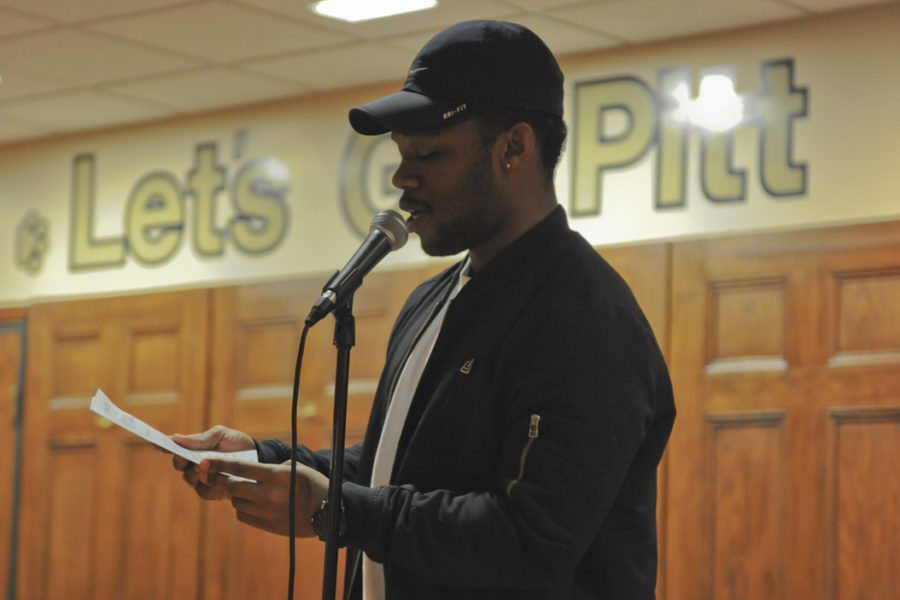Becca Tasker, a junior majoring in anthropology, first started researching civil rights in middle school.
She had learned about the murder of Emmett Till, a 14-year-old African American boy who was lynched in 1955 after being falsely accused of flirting with a white woman.
“I was always into history, and I started learning about the formation and fight for civil rights in the U.S.,” she said. “My parents encouraged my curiosity by buying me books when they could, and taking me to the library.”
So on a chilly Wednesday night in March, Tasker taught four students gathered in room 227 of the Cathedral of Learning about civil rights and liberties when protesting. The event, called “Know Your Rights!” was part of a weekly meeting for Pitt Progressives, a new Pitt club focused on getting left-leaning students on campus engaged in the community.
Tasker, the social media coordinator for Pitt Progressives, covered the legal limits for American protesters, photographers and detainees. She instructed her audience on exercising their First, Fourth and Fifth Amendment rights without going too far and risking arrest or injury at the hands of the police.
This year, more than 250 protesters, some of whom were Pitt students, have been arrested in Pittsburgh and in Washington D.C. for aggravated assault, resisting arrest and trespassing — charges all related to protesting.
Other campus groups have continued to raise funds for those who are currently still facing legal charges — making Tasker’s presentation all the more relevant.
“If you are detained, ask what crime you are being detained for. Until you ask to leave, you can’t walk away — you could be charged with a crime,” Tasker told the students. “How the cops will react depends on what they’re questioning you for, the color of your skin and what part of the country they stopped you in.”
Sam Spearing, a junior political science major and Pitt Progressives business manager, said that knowing your rights is especially important for young people who are fresh to the political scene. Spearing referred to nationwide protests that broke out after Trump’s controversial executive order banning travel between the United States and seven countries with majority Muslim populations.
“[Knowing your rights] has a newfound relevance,” said Sam Spearing, a junior political science major and Pitt Progressives business manager. “There’s been a lot of civil disobedience recently — at the JFK airport after the [first] travel ban, for instance.”
Jeff Migliozzi, a junior marketing major and president of Pitt Progressives, said the group grew out of Students for Bernie, an organization dedicated to supporting Bernie Sanders’ efforts for the Democratic bid during the 2016 election. Although Students for Bernie was focused on the primary election and most of its group members did not join Pitt Progressives, it officially became a student group three months after the 2016 election.
“Before the Pitt Progressives, the left wing at Pitt had to choose between the anarchists or the College Democrats. We wanted to fill in the void between them,” he said. “The Democratic Party is more corporate-leaning. As for middle ground between us and the anarchists, there is probably much less because we do not believe in violence or their general philosophy on society.”
This meeting was about civil rights, but the Pitt Progressives meetings are different each week –– members will present a topic, listen to a guest speaker or hold an event. The gatherings are centered on a common desire to make students more politically active, according to Jeff Migliozzi, the club’s president.
“The main goal of every meeting is getting students more involved politically in our community… at the federal, state, city or university level of politics,” Migliozzi, a junior marketing major, said.
The club recently had an open mic night March 29 for students to express their feelings about the election and the inauguration through poetry, rap and spoken word. At its next meeting on April 12, they will hold a poster-making party in anticipation of the Pittsburgh satellite of the March for Science on April 22, which they are planning and participating in. The March for Science, held on Earth Day, in Washington, D.C., brings attention to funding cuts to the sciences under the Trump administration.
“The march is going to have thousands of participants and scientist speakers, so it is far larger in scale than anything else we have done,” Migliozzi said.
Although Migliozzi would not say which guest speakers are attending the Pittsburgh satellite march, he said the organizers will announce the speakers next week in a press release.
According to Tasker, Progressivism isn’t solely about action — it’s about taking leftist ideologies and making policies that will work for the people.
“[Progressivism is] about moving forward with our actions to make the world a better place,” Tasker said. “We want to continue the passion from the 2016 election and mobilize students to create a passionate movement to help the greater Pittsburgh area.”
More broadly, the Pitt Progressives will focus on working toward universal health care, raising the minimum wage and resisting the Trump administration by supporting the sanctuary campus movement.
“It is important that every person, progressive or not, defends the most vulnerable in our society, and that includes immigrants being rounded up by ICE. We are a nation of immigrants, and Pittsburgh is a city of immigrants,” Migliozzi said.
And though Trump hasn’t been in office for even 100 days, Migliozzi said Pitt Progressives is already looking toward increasing student engagement in the next election, four years from now.
“Voter registration will be huge next year. National organizers of 2016 campaigns noted the lack of political engagement and turnout for such a big school,” he said. “We need to change that [through activism], and this can be done without any official party affiliation.”


